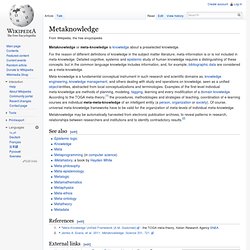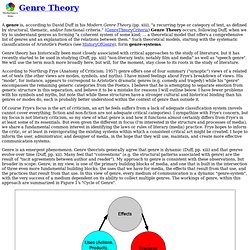

p16.pdf (application/pdf Object) Design philosophy papers > 2003. Design Philosophy Politics. Philosophy of Design, Design Education and Educational Design. Why develop an ontology? Figure 8.

Hierarchy of wine regions. The "A" icons next to class names indicate that the classes are abstract and cannot have any direct instances. The same class hierarchy would be incorrect if we omitted the word “region” from the class names. We cannot say that the class Alsace is a subclass of the class France: Alsace is not a kind of France. However, Alsace region is a kind of a French region. Only classes can be arranged in a hierarchy—knowledge-representation systems do not have a notion of sub-instance. As a final note on defining a class hierarchy, the following set of rules is always helpful in deciding when an ontology definition is complete: The ontology should not contain all the possible information about the domain: you do not need to specialize (or generalize) more than you need for your application (at most one extra level each way).
For our wine and food example, we do not need to know what paper is used for the labels or how to cook shrimp dishes. Figure 9. Intute: Arts and Humanities - Full record details for Derrida : online. Bergson and His Philosophy by J. Alexander Gunn - Full Text Free Book (Part 1/4) Autopoiesis and cognition. This article revisits the concept of autopoiesis and examines its relation to cognition and life.

We present a mathematical model of a 3D tesselation automaton, considered as a minimal example of autopoiesis. This leads us to a thesis T1: "An autopoietic system can be described as a random dynamical system, which is defined only within its organized autopoietic domain. " We propose a modified definition of autopoiesis: "An autopoietic system is a network of processes that produces the components that reproduce the network, and that also regulates the boundary conditions necessary for its ongoing existence as a network. " Metaknowledge. Metaknowledge or meta-knowledge is knowledge about a preselected knowledge.

For the reason of different definitions of knowledge in the subject matter literature, meta-information is or is not included in meta-knowledge. Detailed cognitive, systemic and epistemic study of human knowledge requires a distinguishing of these concepts. but in the common language knowledge includes information, and, for example, bibliographic data are considered as a meta-knowledge. Metaknowledge may be automatically harvested from electronic publication archives, to reveal patterns in research, relationships between researchers and institutions and to identify contradictory results.[2] See also[edit] References[edit] External links[edit] Jacques Derrida. Design philosophy papers > 2003.
Hermeneutics. Elizabeth Grosz. Elizabeth Grosz works in the Women's Studies Program at Duke University.

She has written on French philosophers, including Maurice Merleau-Ponty, Jacques Lacan, Jacques Derrida, Michel Foucault and Gilles Deleuze, as well as Luce Irigaray, Julia Kristeva and Michèle Le Dœuff. Books[edit] Sexual Subversions: Three French Feminists (1989)Jacques Lacan: A Feminist Introduction (1990)Volatile Bodies: Toward a Corporeal Feminism (1994)Space, Time and Perversion: Essays on the Politics of Bodies (1995)Architecture from the Outside: Essays on Virtual and Real Space (2001)The Nick of Time: Politics, Evolution and the Untimely (2004)Time Travels: Feminism, Nature, Power (2005)Chaos, Territory, Art: Deleuze and the Framing of the Earth (2008)Becoming Undone.
Darwinian Reflections on Life, Politics and Art (2011) Edited Books[edit] Feminist Challenges. External links[edit] D E R R I D A : O N L I N E. Wiki: Genre Theory. A genre is, according to David Duff in his Modern Genre Theory (pp. xiii), "a recurring type or category of text, as defined by structural, thematic, and/or functional criteria.

" (GenreTheoryCriteria) Genre Theory occurs, following Duff, when we try to understand genres as forming "a coherent system of some kind; ... a theoretical model that offers a comprehensive list of genres and an explanation of the relations between them. " Such theoretical models, starting with the systematic classifications of Aristotle's Poetics (see HistoryOfGenre), form genre-systems. Genre theory has historically been most closely associated with critical approaches to the study of literature, but it has recently started to be used in studying (Duff, pp. xiii) "non-literary texts; notably film and media" as well as "speech genre". We will use the term much more broadly here, but will, for the moment, stay close to its roots in the study of literature. Genre is an emergent phenomenon. Notes on Genre Theory Frye.